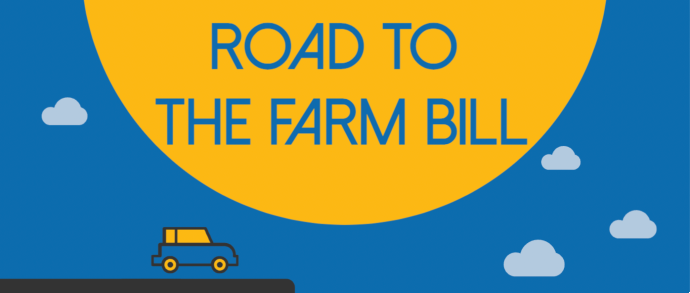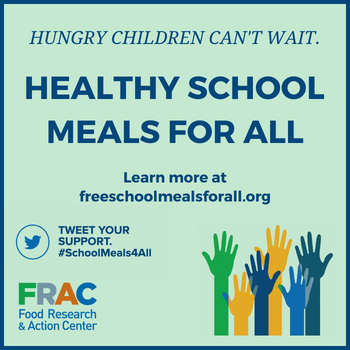School-Based
S.1568 / H.R.3204 – Universal School Meal Program Act
Take Action: Urge your members of congress to co-sponsor.
What it does:
- Creates a nationwide Healthy School Meals for All program
Resources: Press release from Rep. Jim McGovern (D-MA). Use the FRAC Action Network to urge your Members of Congress to cosponsor this critical legislation. Read FRAC’s fact sheet to learn more.
Sen. Bernie Sanders (I-VT) and Rep. Ilhan Omar (D-MN) introduced in the Senate and House on May 11, 2023. Check to see current cosponsors in the House and Senate.
H.R.2567 – School Meals Expansion Act
Take Action: Urge your members of congress to co-sponsor.
What it does:
- Increases federal funding for community eligibility schools and makes more schools eligible
Resources: Press release from Rep. Morgan McGarvey (D-KY). Read FRAC’s fact sheet to learn more.
Rep. Morgan McGarvey (D-KY) introduced on April 10, 2023. Check to see current cosponsors in the House.
H.R.3112 – No Hungry Kids in School Act
Take Action: Urge your members of congress to co-sponsor.
What it does:
- Creates a statewide community eligibility option
Resources: Press release from Rep. Katie Porter (D-CA). Read FRAC’s fact sheet to learn more.
Rep. Katie Porter (D-CA) introduced on May 5, 2023. Check to see current cosponsors in the House.
H.R.3113 – Expanding Access to School Meals Act
Take Action: Urge your members of congress to co-sponsor.
What it does:
- Increases eligibility for free meals to 200 percent and expands direct certification, resulting in increased federal funding for community eligibility schools and better access to school meals for struggling families.
Resources: Press release from Rep. Katie Porter (D-CA). Read FRAC’s fact sheet to learn more.
Rep. Katie Porter (D-CA) introduced on May 5, 2023. Check to see current cosponsors in the House.
H.R.1269 — Healthy Meals Help Kids Learn Act
Take Action: Urge your members of congress to co-sponsor.
What it does:
- Permanently increases federal reimbursement for school meals
Resources: Press release from Rep. Jim McGovern (D-MA).
Representative Jim McGovern (D-MA) introduced on March 1, 2023. Check to see current cosponsors in the House.
H.R.4379 – Stop Child Hunger Act of 2023
- Strengthens and expands the Summer Electronic Benefit Transfer (Summer EBT) program.
The School Hunger Elimination Act
Take Action: Urge your members of Congress to co-sponsor.
What it does:
- Increases federal funding for community eligibility schools, creates a statewide community eligibility option, improves direct certification, and provides retroactive reimbursement for meals served to children who are certified for free or reduced price meals later in the school year.
Sens. Bob Casey (D-PA) and John Fetterman (D-PA) introduced on June 12, 2024.
Resources: One-pager from Sen. Casey. Press release from Sen. Casey.
The Nutrition Red Tape Reduction Act
Take Action: Urge your members of Congress to co-sponsor.
What it does:
- permanently lowers the threshold for schools to participate in community eligibility to 25 percent Identified Student Percentage, ensuring that thousands of schools are eligible to participate.
Sens. Bob Casey (D-PA) and John Fetterman (D-PA) introduced on June 12, 2024.
Resources: Press release from Sen. Casey.
Other SNAP Legislation
H.R. 7585/S. 3893 – Enhanced Cybersecurity for SNAP Act
Take Action: Urge your Members of Congress to cosponsor.
What it does:
- improves EBT security by providing a timeline for states to transition to chip cards and reimburses states for some of the transition costs.
Resources: Press release from Sen. Ron Wyden (D-OR).
H.R. 6005/S. 3089 – Fairness for Victims of Skimming Act
Take Action: Urge your Members of Congress to cosponsor.
What it does:
- permanently extends replacement benefits and full replacement of stolen benefits for SNAP participants.
Resources: Press release from Sen. John Fetterman (D-PA).
H.R.1510 – Improving Access to Nutrition Act of 2023
Take Action: Urge your Members of Congress to cosponsor.
What it does:
- Ends the three-month time limit on SNAP benefits for certain unemployed and underemployed adults who do not document sufficient hours of work each month.
Resources: FRAC H.R.1510 fact sheet. Use FRAC’s customizable email template to urge your Members to cosponsor the bill. Press release from Rep. Alma Adams (D-NC).
Reps. Barbara Lee (D-CA) and Alma Adams (D-NC) introduced March 9, 2023. Check cosponsors in the House.
H.R.706 – SNAP Access for Medically Vulnerable Children Act of 2023
Take Action: Urge your Members of Congress to cosponsor.
What it does:
- Allows households with children with chronic medical conditions to deduct allowable medical expenses.
Rep. Shontel Brown (D-OH) introduced on February 1, 2023. Check cosponsors in the House.
H.R.309 – Opportunity to Address College Hunger Act
Take Action: Urge your Members of Congress to cosponsor.
What it does:
- Notifies a student receiving work-study of eligibility for SNAP.
Rep. Suzanne Bonamici (D-OR) introduced on January 12, 2023. Check cosponsors in the House.
H.R.205 – SNAP Theft Protection Act of 2023
Take Action: Urge your Members of Congress to cosponsor.
What it does:
- Directs USDA to establish criteria for state agencies to identify SNAP benefits stolen by identity theft or skimming.
Rep. Dutch Ruppersberger (D-MD) introduced on January 9, 2023. Check cosponsors in the House.
S.949 / H.R.253 – Puerto Rico Nutrition Assistance Fairness Act of 2023
Take Action: Urge your Members of Congress to cosponsor.
What it does:
- Enables Puerto Rico to participate as a state in SNAP.
Resident Commissioner Jenniffer González-Colón introduced in the House on January 10, 2023. Check cosponsors in the House. Senator Kirsten Gillibrand (D-NY) introduced in the Senate on March 22, 2023. Check to see cosponsors in the Senate.
Root Causes of Hunger
H.R.3899 — The American Family Act
Take Action: Urge your Members of Congress to cosponsor.
What it does:
- Restores the expanded monthly, fully refundable Child Tax Credit.
Resources: Press release from Rep. Rosa DeLauro (D-CT)
Reps. Rosa DeLauro (D-CT), Susan DelBene (D-WA), and Ritchie Torres (D-NY) introduced on June 7, 2023.
Equity
S.5 / H.R.15 – Equality Act
Take Action: Urge your Members of Congress to cosponsor.
What it does:
- Prohibits discrimination based on sex, sexual orientation, and gender identity in areas including public accommodations and facilities, education, federal funding, employment, housing, credit, and the jury system.
Resources: Factsheet from Sens. Jeff Merkley (D-OR), Tammy Baldwin (D-WI), and Cory Booker (D-NJ), and Rep. Mark Takano (D-CA). Press release from Rep. Takano. Press release from Sen. Merkley.
Housing
S.1257 / H.R.3776 – Family Stability and Opportunity Vouchers Act
Take Action: Urge your Members of Congress to cosponsor.
What it does:
- Creates an additional 250,000 housing vouchers specifically designed for low-income families with young children to expand their access to neighborhoods of opportunity with high-performing schools, strong job prospects, and other resources.
Resources: Opportunity Starts at Home Factsheet. Senators Chris Van Hollen (D-MD) and Todd Young (R-IN) reintroduced in the Senate on April 25, 2023. Rep. Joe Neguse (D-CO) introduced the Act in the House on May 31, 2023. Press release from Sen. Van Hollen.
Wages
S.2488 / H.R.4889 – Raise the Wage Act of 2023
Take Action: Urge your Members of Congress to support.
What it does:
- Raises the federal minimum wage to $17 per hour by 2028. Note: The current minimum has been at $7.25 since 2009.
- Phases out employers’ ability to pay sub-minimum wages to tipped workers, workers with disabilities, and teenagers.
- Indexes future increases in the federal minimum wage to median wage growth to ensure wages keep pace.
Resources: Factsheet and press release from House Education and the Workforce Committee Democrats. Press release and factsheet from Sen. Sanders. Economic Policy Institute factsheet. Sens. Sanders (I-VT) and Rep. Bobby Scott (D-VA) introduced on July 25, 2023. Check to see current cosponsors in the Senate and House.
H.R.1468 – Worker Relief and Credit Reform Act
Take Action: Urge your Members of Congress to cosponsor.
What it does:
- Modifies the Earned Income Tax Credit to (1) make the credit available to certain students, (2) modify the age requirement for the credit, (3) include caregiving and learning as compensated work for purposes of the credit, (4) revise the definition of qualifying dependents eligible for the credit, and (5) increase the credit for certain unmarried individuals with two or more qualifying children
- Requires the Internal Revenue Service (IRS) to establish a program for making direct advance monthly payments of the credit to eligible taxpayers.
- Directs the IRS to establish a program to educate taxpayers about the availability of the earned income tax credit and the advance monthly payments of such credit.
Resources: Factsheet and Press release from Rep. Gwen Moore (D-WI).
Early Childhood
S. 4002 / H.R.6707 — Early Childhood Nutrition Improvement Act
What it does:
- Allows an additional meal or snack for children in a full day of care, which improves the adequacy of benefits;
- makes the CACFP payment rate-setting more fair by calculating family child care payments the same as child care center payment;
- streamlines participation for parents and providers by moving to annual eligibility for proprietary child care centers;
- makes improvements to the serious deficiency process; and
- establishes an Advisory Committee on CACFP paperwork.
Senators Bob Casey (D-PA), John Fetterman (D-PA), Richard Blumenthal (D-CT), and Jack Reed (D-RI), introduced on March 20, 2024. Check to see current cosponsors in the Senate. Reps. Suzanne Bonamici (D-OR) and Marcus Molinaro (R-NY) introduced on October 26, 2023. Check to see current cosponsors in the House.
Resources: Factsheet and press release from Senator Casey (D-PA).
H.R.5569 – The Child Care Nutrition Enhancement Act (House Version)
What it does:
- Adds 10 cents reimbursement to eligible meals and snacks in child care, Head Start, at-risk after-school and adult care CACFP;
- eliminates the two-tier system for family child care in CACFP; and
- ensures a family child care provider can submit for reimbursement for her own child’s meals and snacks if the child is in her child care program.
Reps. Greg Landsman (D-OH) and Suzanne Bonamici (D-OR) introduced on September 19, 2023. Check to see current cosponsors in the House.
S.3294 – The Child Care Nutrition Enhancement Act (Senate Version)
What it does:
- Adds 10 cents reimbursement to eligible meals and snacks in child care, Head Start, at-risk after-school and adult care CACFP;
- eliminates the two-tier system for family child care in CACFP;
- ensures a family child care provider can submit for reimbursement for her own child’s meals and snacks if the child is in her child care program; and
- makes the CACFP payment rate-setting more fair by calculating family child care payments the same as child care center payment.
Sen. Robert Casey (D-PA) introduced on November 14, 2023. Check to see current cosponsors in the Senate.


